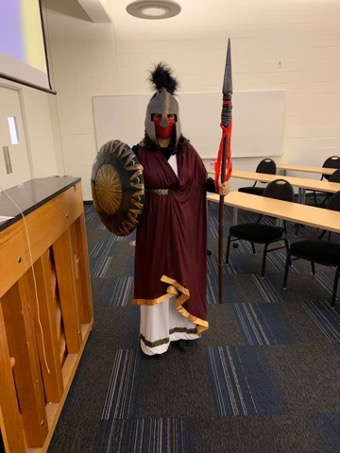
That Day I Came to Class Dressed as Athena: The Pedagogy of Fun
I took a deep breath and stepped out of my office dressed as the Greek goddess Athena. My historically inaccurate Amazon purchase had me in a “Roman Spartan Costume Helmet,” a “Roman Empress” costume over my clothes, holding a large plastic spear and a “Wonder Woman” shield. It was the best I could piece together online, and it would have to do—and this was for fun! 
In our Reacting to the Past (RTTP) game, The Threshold of Democracy: Athens in 403 B.C., the students had to self-start their first Athenian Assembly debate by reenacting a pig sacrifice (pig picture torn in half) while priestesses of Athena offered prayers. The president sat at his table, ready to start the proceedings. They were nervous. I was nervous for them.
So, in a flourish of polyester and plastic I stomped into the classroom. I banged my spear on my Wonder Woman shield and stood behind the shocked priestesses. I whispered, “Go for it!”
Student faces were a mix of shock and amusement; I was certainly not cool enough for a couple of them. But who cared? My priestesses pulled it off, the pig was sacrificed, and the president called the meeting to order. They debated and voted. The next week I gave extra credit for showing up in a toga, and about 20 percent of the class came wrapped in random bed sheets. In preparation for our five-session role playing game I told them repeatedly to “just have fun with it!” and fun was had!
At the end of the game I had students fill out a “Win Sheet” where they discussed what they accomplished and reflected on their own game play. Paraphrases of some responses ranged from “I didn’t think that this would be fun, but it was,” and “I have never liked history before,” to “I normally don’t speak up in class, but this helped me overcome that” and “I met new people and made friends.” I took that for a win.
For this church history professor assigned to teach Western Civilization, the RTTP role playing game provided a way to make a notoriously boring class engaging (for all of us). As it turns out, I had stumbled upon a “ludic pedagogy” or the “pedagogy of fun”: Sharon Lauricella and T. Keith Edmunds’ post, “A Serious Look at Fun in College Classrooms” discusses how the rigor of education is not lost in a fun environment, rather it lowers the cognitive load and increases intrinsic motivation and learning.
It is probably no surprise to you that studies show that by making learning fun, student stress decreases and learning increases. The bigger question most professors ask isn’t, “Should I try this?” but rather, “What would this look like in my classroom?”
Here are some ideas that I have tried:
- We reenact a house church with dollar store decor and food.
- During review week, students write either three church history characters or the attributes from them that they want to have in their own life on a dollar store Christmas ornament.
- At the end of the class around a common question, “Why do we have so many denominations?” I have students create their own church with their denomination of choice, or none. They design a building, pick a symbol for the logo, choose the music, governance style, etc. They are creative, and they enjoy the in-class activity “for fun.”
- When studying the Desert Fathers and Mothers, we learn to make prayer ropes from a YouTube video. The joy in this is that the knot is almost impossible to make, so we have a good laugh trying.
- Pre-pandemic, we went for pizza and then visited a Russian Orthodox Church together.
- A class did the Reacting to the Past’s “Trial of Anne Hutchinson.” (There was burning at the stake!)
- The Reacting to the Past “Council of Nicaea” role playing game is on my radar for the future. NOTE: These RTTP games are not intuitive to lead, you’ll need all summer to prepare. I highly recommend joining the association and the Facebook group for help. Plan on the game taking four to eight weeks of your semester.
Clearly this is not an exhaustive list and many of you have your own successes to add. If you could take a moment to write down some of those in the comments, this could make it a very helpful space for all of us searching for new ideas.
Leave a Reply